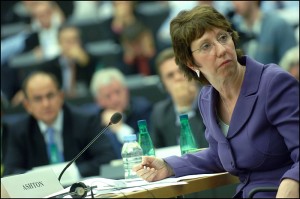 EU foreign policy chief, Catherine Ashton, has her detractors. For clarities sake, let it be said that this blogger is not one of them. For sure, the EU’s foreign policy, which Ashton is head of, is far from optimal. It lacks both coherence and clout, in particular when it comes to the “hard” security and defense elements of foreign policy. But isn’t blaming Ashton a case of misguided criticism? Isn’t the case that, with Ashton, member states have gotten what they want from their “foreign minister”?
EU foreign policy chief, Catherine Ashton, has her detractors. For clarities sake, let it be said that this blogger is not one of them. For sure, the EU’s foreign policy, which Ashton is head of, is far from optimal. It lacks both coherence and clout, in particular when it comes to the “hard” security and defense elements of foreign policy. But isn’t blaming Ashton a case of misguided criticism? Isn’t the case that, with Ashton, member states have gotten what they want from their “foreign minister”?
Take Afghanistan. Without getting into a discussion about the Afghan war, the variance with which European nations participate in this conflict demonstrates that the EU’s foreign policy is viewed as pick-and-chose deal by member states.
Even Europe’s Afghan flagship EUPOL (EU’s Afghan police training program launched under a Common Security and Defense Policy mandate) – in its conception a fairly limited train the trainers program – proved too big a mouthful. This independent European program was initially earmarked for 400 personnel, but has, in fact, not been able to muster 300. A fresh British government report labels EUPOL “woefully inadequate”, pointing to, among other things, Brussels’ bewildering procurement and decision making process.
Ashton has been accused of lacking the necessary assertiveness, lacking foreign policy experience, and not being willing to travel to hot spots and high level talks. In particular, she caught flak for her tardiness in visiting Haiti following the earthquake, and of course, more recently, for not taking a more decisive stand against the dictators of North Africa and the Middle East. And there did indeed seem to be a consistent lag between Ashton’s reactions and those of Europe’s national leaders.
But, in judging Ashton’s reactions, let’s remember that the EU is a hybrid construction, part state, part international organization. And of course, let’s remember that the High Representative quite clearly only has a mandate to represent the EU on matters that the European Council (a member state body) have unanimously agreed upon. Therefore, her actions must be viewed in the light of the timidity and inconsistency which Europe as a whole took toward the recent tumultuous events.
On the one hand, Britain’s Cameron pushed for, and obtained, a stronger European stance on Mubarak at the EU’s February 4 summit. On the other hand, Italy’s Berlusconi caused waves with the statement that; “There could be a transition towards a more democratic system without a break with a president like Mubarak who, for all the West starting with the US, has always been considered a wise man and a point of reference.”
Viewed in the context of the Cameron-Berlusconi gap, and considering the High Representative is tasked with representing the EU as a whole, it would seem that Ashton’s timidity and slowness is pretty much to be expected.
This is perhaps a harsh judgment; but recent events seem to confirm that the EU foreign policy channel is used when member states perceive it to be the most expedient way to secure their interests. For example, European nations see no problem in negotiating trade agreements as a block. On the other hand, with regards to Tunisia and Egypt; the southern European nations, with Italy and France in the lead, consider stability in their backyard a definite priority. For northern Europe – not so much. In short, isn’t the voluntary nature of much of the EU’s foreign policy to blame for its timidity, rather than the unfortunate shepherd charged with herding the European cats?
Yes, the quiet style of Ashton does not fit well with momentous events where people expect leaders to state, loud and clear, their position, and the direction they intend to follow. Even so, considering the give-and-take nature of the EU the cautious style comes with the turf. Ashton must out of necessity take on the role of a facilitator, assisting 27 nations understand their common objectives, rather than the role of the strong leader taking decisive stands. An assertive European foreign policy chief with an independent agenda? It just wouldn’t work.